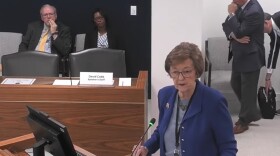Updated at 6:45 p.m.
Governor Roy Cooper says he intends to sign the nearly $26 billion state budget that is making its way through the Legislature this week. He made the announcement Tuesday just before the state Senate gave its initial approval to the proposal.
This will be the first time Cooper signs a state budget into law since becoming governor. At a news conference Tuesday, Cooper said the budget gets some things wrong, and many things right, including raises and bonuses for teachers.
“However imperfect this is, we need relief right now,” Cooper said.
In a crucial vote Tuesday, the Republican-majority Senate approved the two-year budget plan with significant support from Democrats, including Cooper. With a spending plan that's 4 1/2 months late, North Carolina is currently the only state in the nation without an enacted budget, according to the National Conference of State Legislatures.
Our schools, communities, small businesses, and families need our help right now, especially as we recover from this pandemic.
— Governor Roy Cooper (@NC_Governor) November 16, 2021
I will sign this budget because of its critical and necessary investments and I will fight to fix its mistakes. - Gov. Roy Cooper pic.twitter.com/1ayc9smM0b
Cooper said he still intended to work to remedy what he considers faults in the budget.
“I will sign this budget because of its critical and necessary investments,” Cooper said. “And I will fight to fix its mistakes.”
Cooper cited several of those "mistakes." The budget does not expand Medicaid and includes, what he calls, misguided tax cuts. On tax policy, Cooper says he supports the increase to the child credit, does not support cuts for the wealthiest.

Republican Senate President Pro Tem Phil Berger said it's a budget the state can afford.
"And we can afford by allowing the people of the state to keep more of their hard-earned dollars."
The Senate will have a final vote on the budget tomorrow before the House takes it up on Wednesday. The budget plan will likely pass the full legislature by week's end and then get Governor Roy Cooper's signature.
Cooper has said he will fight — in court — a provision that would hamper the governor's powers to declare emergency protocols, as he has during the pandemic.
The budget breakdown
The proposed spending plan is $25.9 billion, which represents a little more than a 4% increase compared to current spending levels. It includes raises and bonuses for nearly all state employees. For this fiscal year, a salary increase of 2.5% would take place retroactive to July 1st. Another 2.5% raise is included for the 2022-23 fiscal year. Community college, UNC System, and rank and file state employees with an annual salary of $75,000 would also receive a $1,500 bonus. Workers making more than $75,000 would receive a $1,000 bonus.
Public school teachers would see increases in their step schedule under this proposed spending plan. These increases would also result in an average 5% increase over the next two years, according to legislative staff. In addition, K-12 staff would receive the same bonuses as state employees, as well as a $300 additional bonus. Also, public educators would receive a separate $1,000 retention bonus come January. This one-time lump sum would be for teachers still employed who have also completed a COVID-19 training. This bonus amounts to something of a retention bonus and would be paid with federal funds.
This budget also includes a one-time cost of living adjustments for retired state workers, and teachers. The amounts are 2% for this year and 3% for the next fiscal year.
The spending plan would lower the personal income tax rate and completely phase out the corporate income tax in North Carolina by around the end of the decade. Presently North Carolina has the lowest corporate rate (2.5%) of any state in the country with a corporate tax. This bill also eliminates taxes on military pension income.
Read more on what the budget proposes here.
The Associated Press contributed to this report.









